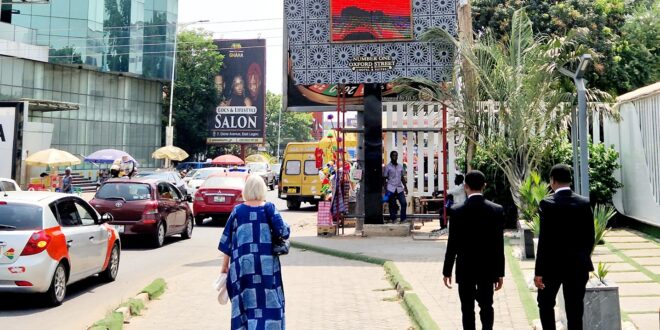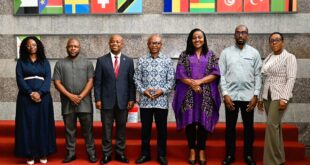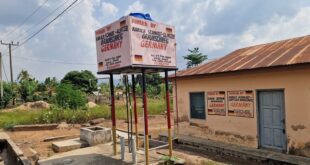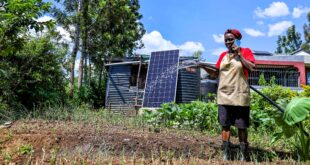Violent conflict and insecurity continue to ravage parts of Africa — from the brutal civil war in Sudan and persistent unrest in South Sudan, to Islamist insurgencies spreading across the Sahel and ongoing fighting in the eastern Democratic Republic of Congo.
In recent years, countries such as Nigeria, the Central African Republic, Ethiopia and Mozambique have also grappled with violent insurgencies or terrorism. These crises have claimed thousands of lives, displaced millions, and severely disrupted economic activity, regional cooperation and development goals. The result in the affected countries are worsening living conditions.
Yet amid these challenges, many African nations have demonstrated remarkable resilience by maintaining peace and stability. These nations offer valuable lessons and models for the rest of the continent.
In a region too often associated with conflict in international headlines, these countries reveal another, equally real Africa — one that is resilient, secure and steadily progressing.
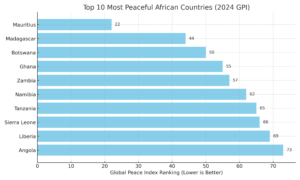
![]()
The Global Peace Index (GPI), published annually by the Institute for Economics and Peace (IEP) and now in its 18th edition, is the world’s leading measure of global peacefulness. It assesses 163 countries using 23 indicators covering societal safety and security, the extent of ongoing domestic and international conflict, and the degree of militarisation. The GPI is widely respected among governments, policymakers and researchers as a reliable benchmark for evaluating peace and stability.
According to the current GPI, released in June 2024, the ten most peaceful countries in Africa are:
-
Mauritius – Ranked 22nd globally, Mauritius continues to lead the continent in peaceful development, thanks to strong democratic institutions, low crime rates and inclusive economic policies.
-
Madagascar – Holding the 44th position globally, Madagascar is recognised for its relative stability and low levels of conflict.
-
Botswana – At 50th globally, Botswana benefits from a long-standing tradition of stable democracy and sound economic governance.
-
Ghana – Ranked 55th globally, Ghana is noted for its peaceful democratic political transitions and vibrant civil society.
-
Zambia – With a global ranking of 57, Zambia’s political stability and low crime rates make it an increasingly attractive destination for tourism and investment.
-
Namibia – Ranked 62nd globally, Namibia’s effective governance and economic diversification underpin its peaceful environment.
-
Tanzania – At 65th globally, Tanzania is recognised for its consistent long-reigning regional stability and calm political climate.
-
Sierra Leone – Ranked 66th globally, Sierra Leone has made commendable progress in sustaining peace following its civil war.
-
Liberia – At 69th globally, Liberia continues to reinforce its post-conflict efforts with peaceful democratic development.
-
Angola – Ranked 73rd globally, Angola’s steady post-war reconstruction has helped improve its peace rating.
These rankings show that even amid widespread instability, many African countries are successfully fostering environments conducive to peace and development.
As the continent navigates complex and often overlapping challenges, the resilience of its most peaceful nations offers not only a beacon of hope — but also a practical blueprint for building a more secure and prosperous future.
Femi Awoniyi
 THE AFRICAN COURIER. Reporting Africa and its Diaspora! The African Courier is an international magazine published in Germany to report on Africa and the Diaspora African experience. The first issue of the bimonthly magazine appeared on the newsstands on 15 February 1998. The African Courier is a communication forum for European-African political, economic and cultural exchanges, and a voice for Africa in Europe.
THE AFRICAN COURIER. Reporting Africa and its Diaspora! The African Courier is an international magazine published in Germany to report on Africa and the Diaspora African experience. The first issue of the bimonthly magazine appeared on the newsstands on 15 February 1998. The African Courier is a communication forum for European-African political, economic and cultural exchanges, and a voice for Africa in Europe.

